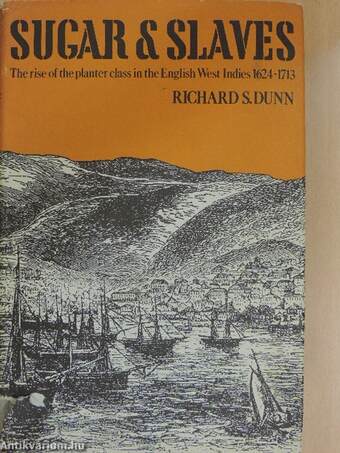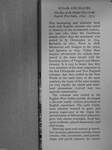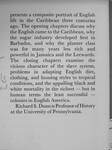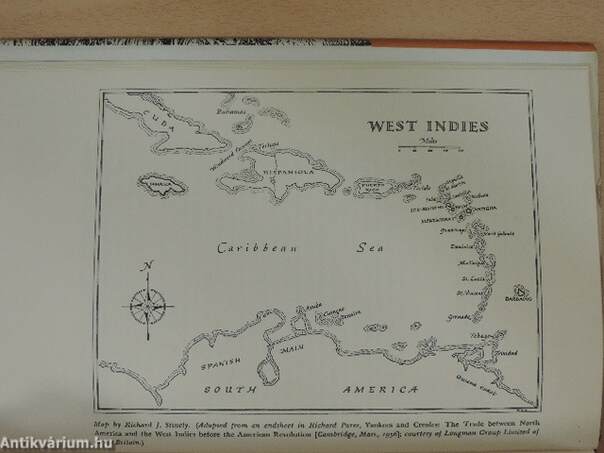1.118.325
kiadvánnyal nyújtjuk Magyarország legnagyobb antikvár könyv-kínálatát
Sugar and Slaves
The Rise of the Planter Class in the English West Indies, 1624-1713
| Kiadó: | Jonathan Cape |
|---|---|
| Kiadás helye: | London |
| Kiadás éve: | |
| Kötés típusa: | Fűzött kemény papírkötés |
| Oldalszám: | 359 oldal |
| Sorozatcím: | |
| Kötetszám: | |
| Nyelv: | Angol |
| Méret: | 24 cm x 16 cm |
| ISBN: | 0-224-00814-5 |
| Megjegyzés: | Néhány fekete-fehér illusztrációval, térképpel. |
naponta értesítjük a beérkező friss
kiadványokról
naponta értesítjük a beérkező friss
kiadványokról
Fülszöveg
SUGÁR AND SLAVES
The Rise of the Planter Class in the
English West Indies, 1624 - íj 13
This fascinating and scholarly book deals with English colonists who sailed to America in the seventeenth century, the ones who chose the Caribbean islands rather than the mainland, who settled in St Christopher in 1624, Barbados in 1627, Nevis in 1628, Montserrat and Antigua in the 1630S, and Jamaica in 1655. Today these tropical adventurers are seldom men-tioned in the same breath with the founding fathers of Virginia and Massa-chusetts. It is easy to forget that they were members of the same migration as the first Chesapeake and New England colonists, that they settled in the New World at the same time, in the same numbers, for many of the same reasons, yet very rapidly the island and mainland plantations evolved into two separate communities.
The colonists who settled in the English West Indies quickly developed a life-style totally without precedent in English experience. The early... Tovább
Fülszöveg
SUGÁR AND SLAVES
The Rise of the Planter Class in the
English West Indies, 1624 - íj 13
This fascinating and scholarly book deals with English colonists who sailed to America in the seventeenth century, the ones who chose the Caribbean islands rather than the mainland, who settled in St Christopher in 1624, Barbados in 1627, Nevis in 1628, Montserrat and Antigua in the 1630S, and Jamaica in 1655. Today these tropical adventurers are seldom men-tioned in the same breath with the founding fathers of Virginia and Massa-chusetts. It is easy to forget that they were members of the same migration as the first Chesapeake and New England colonists, that they settled in the New World at the same time, in the same numbers, for many of the same reasons, yet very rapidly the island and mainland plantations evolved into two separate communities.
The colonists who settled in the English West Indies quickly developed a life-style totally without precedent in English experience. The early Caribbean planters learned to grow and process sugar-cane in the 164OS, im-ported armies of African slave labourers, grew rich almost overnight, lived fast, spent recklessly, played desperately, and died young.
Drawing upon such sources as travel-lers' accounts, plantation records, census returns, wills, inventories, land patents, .maps, and parish registers, the author
presents a composite portrait of English life in the Caribbean three centuries ago. The opening chapters discuss why the English came to the Caribbean, why the sugár industry developed íirst in Barbados, and why the planter class was for many years less rich and powerful in Jamaica and the Leewards. The closing chapters examine the vicious character of the slave system, problems in adapting English diet, l clothing, and housing styles to tropical conditions, and the appalling black and white mortality in the richest — but in humán terms the least successful — colonies in English America.
Richárd S. Dunn is Professor of History at the University of Pennsylvania. Vissza
Témakörök
- Történelem > Társadalomelmélet
- Idegennyelv > Idegennyelvű könyvek > Angol > Történelem > Egyéb
- Szociológia > Társadalmi csoportok > Kisebbségek > Egyéb
- Történelem > Idegennyelvű > Angol
- Idegennyelv > Idegennyelvű könyvek > Angol > Szociológia > Társadalmi csoportok > Kisebbségek > Egyéb
- Szociológia > Társadalmi csoportok > Munkájuk szerint > Egyéb
- Történelem > Kontinensek szerint > Amerika, amerikai országok története > Latin-Amerika
- Történelem > Újkor > Egyéb
Richard S. Dunn
Richard S. Dunn műveinek az Antikvarium.hu-n kapható vagy előjegyezhető listáját itt tekintheti meg: Richard S. Dunn könyvek, művekMegvásárolható példányok
Nincs megvásárolható példány
A könyv összes megrendelhető példánya elfogyott. Ha kívánja, előjegyezheti a könyvet, és amint a könyv egy újabb példánya elérhető lesz, értesítjük.









